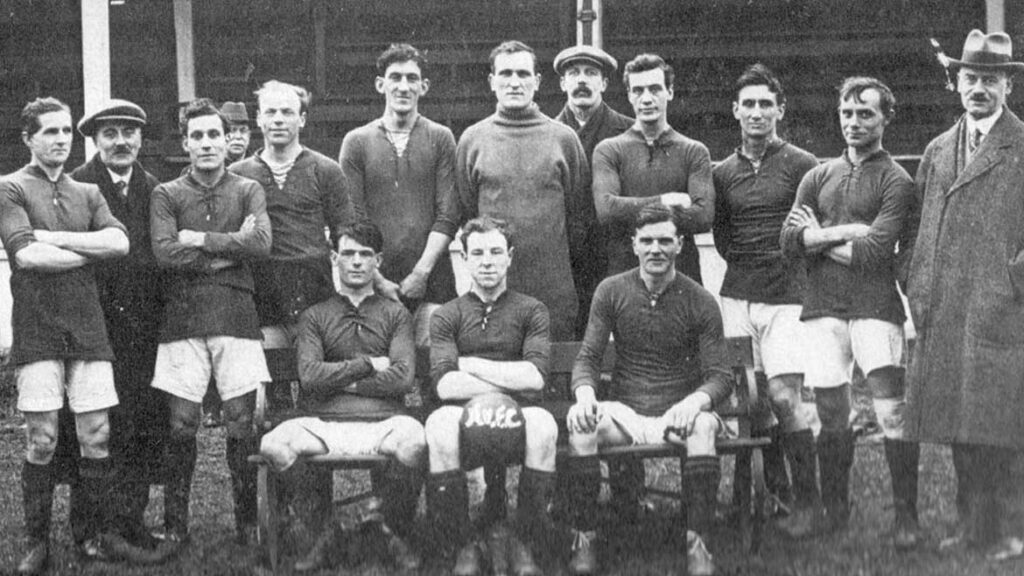‘Unprecedented’ is one of the buzzwords of the time, in life as in football. For fans of the latter, the lack of sport of any kind may pale into insignificance alongside greater concerns globally but the shutdown of the National League amongst others is a new experience for Fleet fans.
The annual close season has been the only lack of weekly football most of us have suffered in our collective years of support of the club – but there were, of course, a few previous instances… even if we have to delve back into the mists of time for them.
The original Fleet – Northfleet FC – went out of business for just short of four years from 1899 to 1903 and coupled with a season (1902/03) when Gravesend United went the same way, local fans had to journey outside the borough to find their football fix.
For Gravesend, the year’s inactivity cost them use of their Overcliffe Ground but they were able to set up in new premises on Pelham Road, now the site of Mayfield Grammar School.
Northfleet returned after a get-together in Christmas 1902 – and like all good ideas, it happened in the pub, Ye Olde Leather Bottle at the top of Northfleet High Street to be precise. The club returned to friendly and league action in September 1903 and within two years had set up camp on Stonebridge Road.
The next local football shutdown arrived, of course, in 1914 with the outbreak of the First World War. It wasn’t, like coronavirus, an instant shutdown. Some clubs shut early but there was still competitive football taking place a good four months after the commencement of hostilities.
Some 170 men from the Gravesend League enlisted immediately and Gravesend United signalled their intention to suspend activities after a last friendly against Northfleet on September 12th.
Northfleet played on a little longer, until November 14th, but with official and public opinion rapidly swaying towards a cessation of “frivolous activities”, the gates of Stonebridge Road were shut two days later and the club’s holdings of shirts, boots, balls and towels were donated to the war effort.
“It was not the time to play games,” wrote chairman Joe Lingham. “Without exception over these past months, the players and committeemen have stood loyally by the club and are entitled to no small meed of praise for their action.”

Gravesend’s Pelham Road ground was requisitioned for military purposes and the club never recovered once the war ended, going into a period of dormancy that didn’t end until 1932 when a much less powerful outfit emerged in the Kent Amateur League, playing initially at Milton Barracks, Milton Road and then Central Avenue where the Ascot Arms public house stands.
For the Fleet, Stonebridge Road reopened on August 30th 1919 (main picture, top), after almost five years of shutdown. Post-war crowds were initially booming and through the 1920s and 1930s, Northfleet fans enjoyed watching a very successful local side.
A shutdown for another conflict came about once more with the Second World War. This time, Northfleet waited no time: their last match was against Dartford (as it had been on both previous shutdowns in 1899 and 1914) the day before Britain declared war and after the game, club president Joe Lingham gathered the players and management to announce closure, wishing them good luck in the forthcoming conflict.
Gravesend United, meanwhile, continued to play on during the war in much more localised leagues – so while formal competition ended or was repurposed into ‘wartime leagues’, the public was never quite without football, unlike now. And with both world wars commencing in line with the beginning of the football season, it was much simpler for authorities to simply suspend league competition without argument about titles, points, promotion and relegation.
The boot was on the other foot as the clubs emerged from six years of war in 1945 – this time Gravesend survived and Northfleet did not and from the ashes of that, both clubs merged into our present-day club. Ironically, the new Fleet’s first game – August 30th, 1946 – came on the same day 27 years on from the old Fleet’s first game after the First World War.

Since then, there have been 73 seasons of unbroken league competition – until now. The only notable shutdowns have come about as a result of the weather, the most serious being the Big Freeze of 1962/63 when Fleet fans saw only one football match between Boxing Day and February 12th – but the consolation was that one game was the win over Carlisle United in the FA Cup Third Round that set up our next game, the huge clash and all-time record attendance v Sunderland at Stonebridge Road.
Which brings us full circle back to the ‘unprecedented’ situation we find ourselves in currently. The Fleet have lived through these shutdowns – extending from a couple of weeks, to four, five and seven years – and come back each and every time. We hope, of course, that your temporary football fix is as temporary as can be and that we can look back on this latest shutdown as but a brief hiatus in our history.




